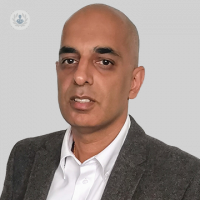Cardiac resynchronisation therapy (CRT): what is it?
Escrito por:Cardiac resynchronisation therapy is a treatment for heart failure by implantation of a special pacemaker. It compliments optimal medical therapy rather than replaces it. If your everyday life is becoming more restrictive due to symptoms of breathlessness and feelings of exhaustion, CRT may be right for you.
We asked one of our leading cardiologists in Cambridge, Dr Munmohan Singh Virdee, just how CRT may help your heart and who might be suitable for the device.

How does CRT help your heart?
With a ‘normal’ pacemaker, a lead is placed in the right ventricle only. The pacemaker used to deliver cardiac resynchronisation therapy uses leads to both ventricular chambers of the heart, that is, it paces both the left and right ventricle.
The lead to the left ventricle is expertly placed within the veins on the surface of the heart. Via these two leads, the pacemaker can co-ordinate contraction of the heart by the synchronous stimulation of both chambers.
Who is a candidate for CRT?
To benefit from a biventricular pacemaker, one has to have impaired contraction of the heart and dis-coordinate contraction of the heart muscle. There can be dis-coordinate contraction between the right and left ventricles, or between regions of the left ventricle. The patients who benefit most from cardiac resynchronisation therapy are those with the most dis-coordinate contraction.
The most benefit is seen in patients who have bundle branch block on their ECG, which results in the slow spread of electricity through the ventricles. Patient selection is very important, and patients with an ejection fraction less than 30% and with left bundle branch block benefit the most. The benefit is felt with improved symptoms, but also improved prognosis.
What are the two types of CRT devices and how are they different?
There are two types of devices which deliver CRT. A CRT-pacemaker is a device which delivers electrical impulses to the heart to correct slow electrical conduction. It thus improves cardiac contraction as explained above.
A CRT-defibrillator does this too, for example, it is a pacemaker too, but it is also able to deliver an electric shock to the heart should it suffer from a fast and dangerous heart rhythm. Patients with heart failure are at risk of these heart rhythms, which untreated cause cardiac arrest. There are positives and negatives to having a defibrillator, which is why there are two types of device.
Dr Singh Virdee specialises in cardiac electrophysiology, device implants and catheter ablations. You can book an appointment with him here via his Top Doctor’s profile.



